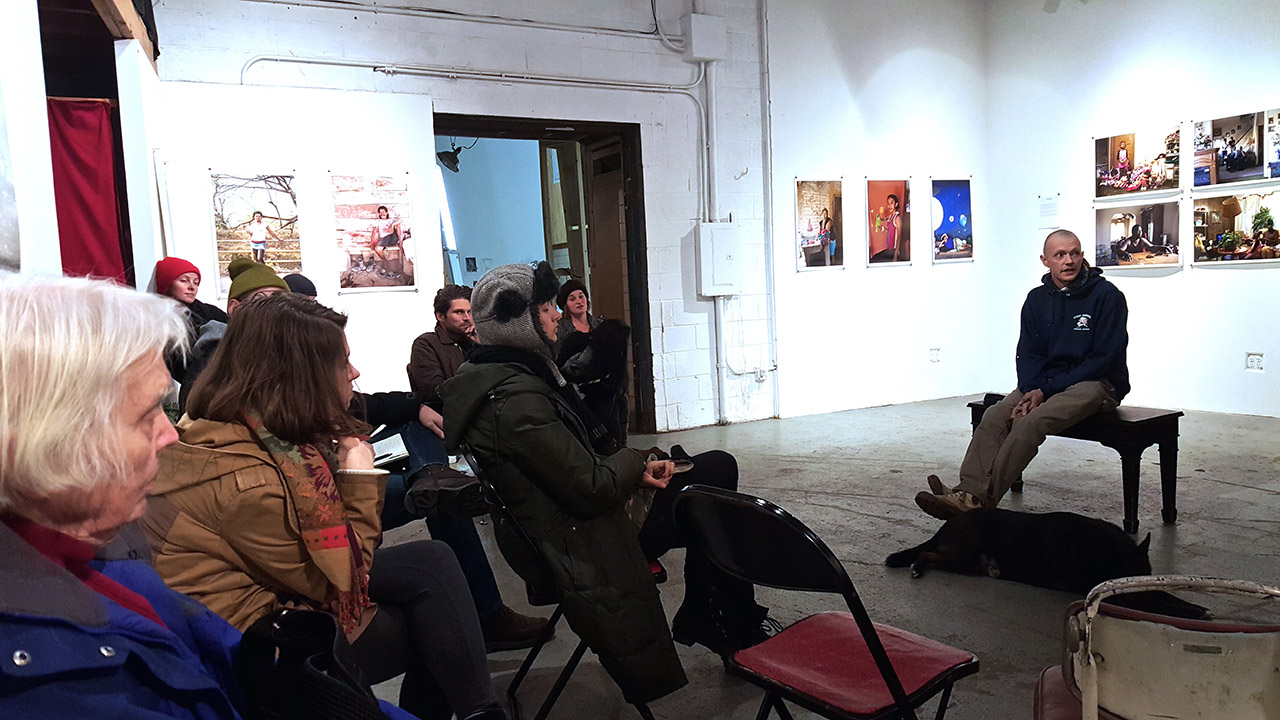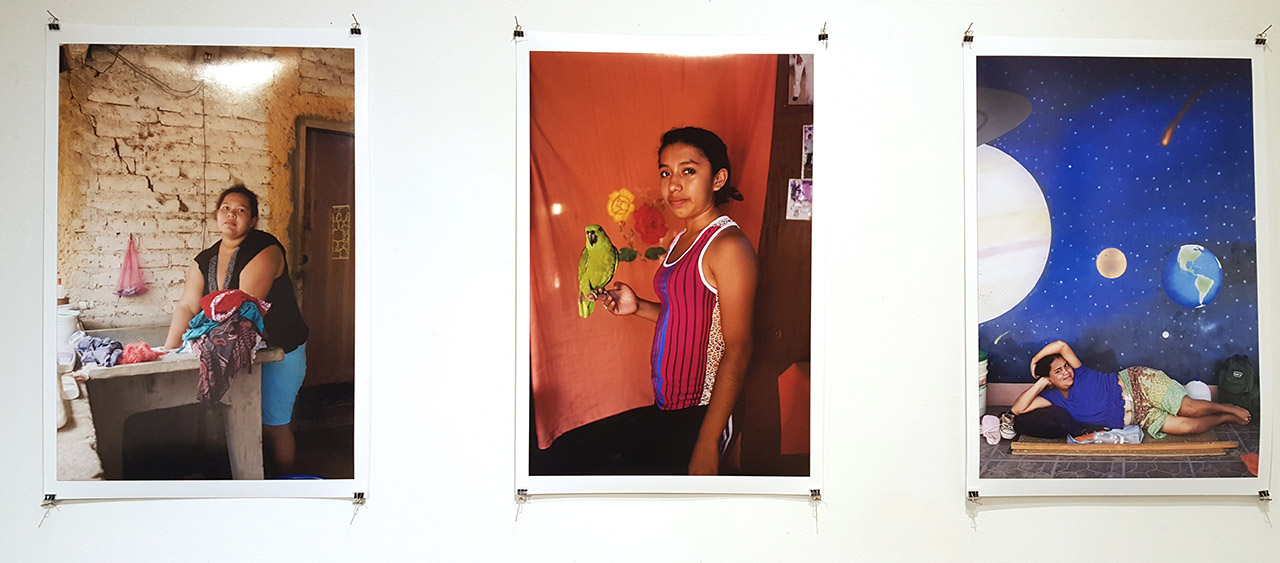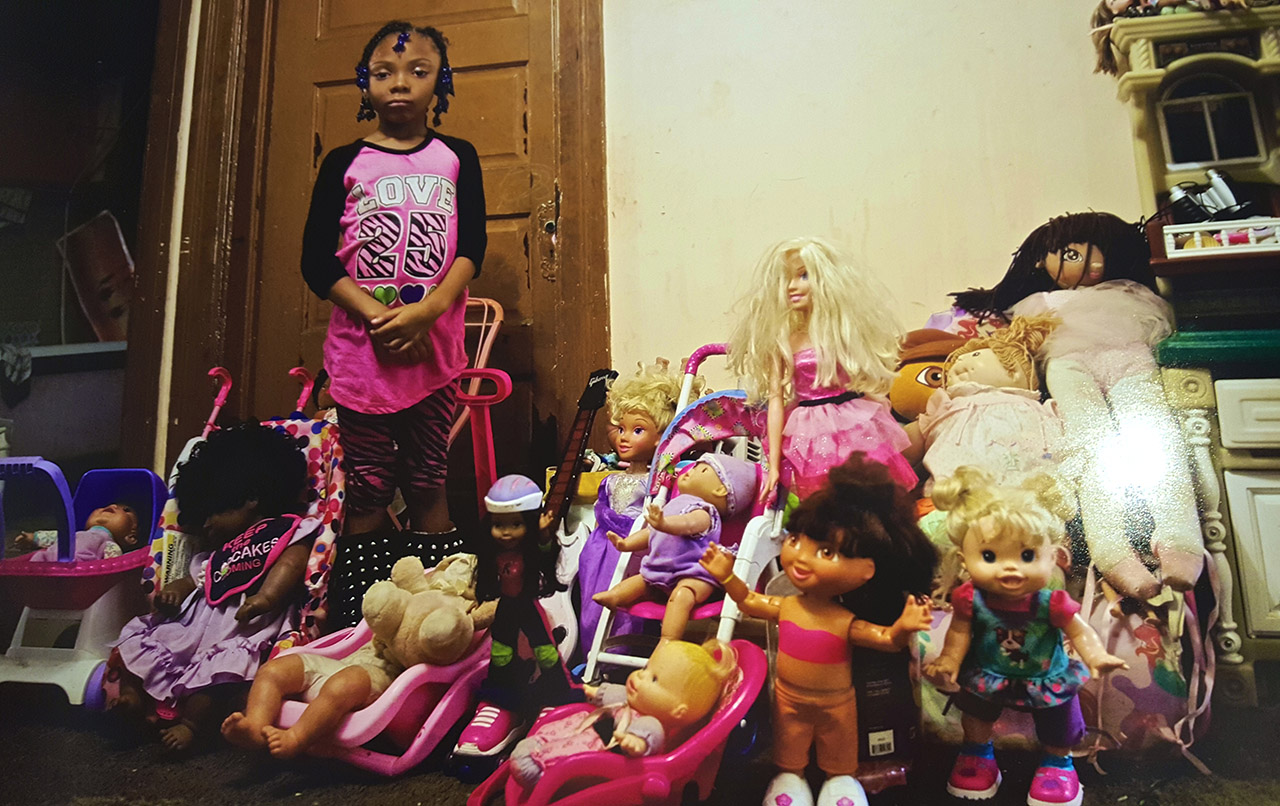
Photographer Garrett MacLean questions nature of progress with multifaceted show in Detroit
Photo: Garrett MacLean in discussion with attendees at his artist talk. Photos by Rosie Sharp.
At Popps Packing, a Knight Foundation grantee in Hamtramck, Mich., the November exhibition focused on the work of photographer Garrett MacLean. “Make Way for Progress (A Story of Displacement)” presented people MacLean met over the course of two visits to Nicaragua.
His first trip was three years ago, when MacLean first met residents of a small fishing village that has developed, culturally and commercially, through its relationship with a lake. The lake is the largest primary drinking water source in the entire country, as well as a major source of commerce in Nicaragua–the second-poorest country in the Western Hemisphere, after Haiti.
MacLean made his second trip in the spring of 2015, when he received word that the village and livelihood of people he had come to know were under imminent threat from a massive $50 billion canal-building project. Funded by a Chinese billionaire who seems to be motivated by political as well as financial interests, the project is slated to bisect Nicaragua, displacing 120,000 residents or more. Displaced residents will be offered merely 10 percent of the value of their land in forced sales, without counting the damage that relocation will have on their livestock or orchards of avocado and mango trees.

Three of MacLean’s Nicaraguan portraits.
As he has previously done in Haiti’s Central Plateau, MacLean took up his camera and headed for the scene, yielding a portrait series from Nicaragua that was the subject of an artist talk at Popps Packing on Nov. 24. The talk was presented in collaboration with the Hamtramck Free School, a People’s Choice Award winner during the most recent Knight Arts Challenge Detroit. MacLean delivered an overview of the circumstances surrounding his visit and his process of engaging with the landscape, which included walking the 30-kilometer path where the canal is supposed to be built—a project that was hurried through the approval process by the president of Nicaragua in a single week, without any environmental impact study or the opportunity for anyone to voice dissenting opinions.
MacLean’s tendency is to engage with people as he meets them, eventually letting them know he would like to take a picture, and encouraging them not to smile, but rather meet the camera on their own terms. What emerges is an exquisite array of images that capture daily the life and environs that will be irrevocably changed by this proposed infrastructure, which seems designed to benefit a select group who wield power.
“I don’t know how we get around a system that is based on growth,” MacLean said during his talk and the open discussion that followed. As with many presentations by the Free School on social and environmental justice issues, the question seems never to be what is right, but what can be done about it.
MacLean referred specifically to the Daniel Quinn book, “Ishmael,” as a transformative text that dislocated him from a path of middle-class privilege, seemingly reprogramming him to give attention to the plight of individuals with fewer resources to stand in defense of their human rights. As Free School organizer Michael Brown pointed out, it is sometimes the distance between places like the United States and Nicaragua that impedes our ability to be proactive in supporting native populations being disenfranchised by industry.
But that argument holds little water in light of a similar scenario currently being played out on every block of Detroit.

One of MacLean’s Detroit portraits: a child about to be relocated out of her foreclosed home.
This is the final aspect of “Make Way for Progress,” and the one that brings the issue very much to our doorstep. As the Duggan mayoral administration endeavors to combat blight and get Detroit back on track for success (like “progress,” a term that applies highly relatively to different citizens), the city is facing what many consider a tax foreclosure crisis. According to data compiled by Detroit-based startup Loveland Technologies, there are more than 60,000 properties in Detroit that are subject to tax foreclosure by the Wayne County Treasurer, as a result of unpaid property taxes that have been delinquent for more than three years. In the most recent of the county’s two 2015 property auctions, nearly 30,000 homes were put up for sale, and approximately 8,000 of these were occupied. It has been widely documented in local and national media that many of these residents were renters, paying rent in good faith, with no idea that their landlords had stopped paying property taxes, or even that their homes were slated for the auction block.
MacLean’s work with The Tricycle Collective, a local nonprofit that aims to “[keep] Detroit at home,” has buttressed his ongoing Detroit portrait series. The works included in the show at Popps Packing focus on citizens that, like those in Nicaragua, find themselves on the verge of being permanently displaced from their homes in the name of sweeping infrastructural change, all billed as serving the greater good.
Will MacLean’s work to document the people who may be displaced by the canal project or the sweep of foreclosures change the outcomes of these projects? Perhaps not. But as his mind was changed by Quinn’s missive, one senses that MacLean hopes, through his pictures, to do the same. “If people can see the impact these things have on real people, it’s just harder to accept it as an inevitability,” he said.
Recent Content
-
Artsarticle ·
-
Artsarticle ·
-
Artsarticle ·
